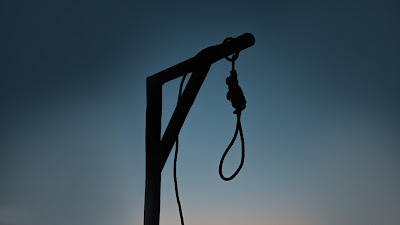- Get link
- X
- Other Apps
Esther 5
- Summary
On the third day of fasting Esther dressed herself in her royal clothes and stood in the inner court of the king's house across from the king on his throne. On seeing her the king held out his golden sceptre to her, which Esther touched.
The king asked Esther what she wanted, promising to give her half his kingdom, but Esther simply and humbly invited the king and Haman to a banquet which she had prepared for him. The king accepted ordering that Haman be quickly called.
Whilst at the banquet the king again asked Esther what it was she wanted, repeating his promise of up to half of his kingdom. Esther again very respectfully invited the king and Haman to another banquet on the following day telling him she would give him her petition then.
Haman left this first banquet with joy at being singled out so, but this was quickly turned to indignation when he passed Mordecai in the king's gate and noticed how he didn't bow down to him. Refraining himself until he got home he told his family and friends how he had been singled out with such favour by the king and queen, how rich and prosperous he was, but yet how it all seemed as nothing when he saw Mordecai.
Haman's wife and friends counselled him to build a gallows to hang Mordecai and ask the king's permission to do so on the following day so that he could then enjoy the banquet. Their advice pleased Haman and he ordered the gallows to be constructed.
- Thoughts
As I read verse 1, 'Now it came to pass on the third day' I thought how weak Esther must have felt after 3 days of fasting, and then as I read her request to the king to come to the banquet I thought how self-controlled she was.
Perhaps because of the grave situation she was putting herself in, and perhaps because of her strange relationship with her powerful and unpredictable husband she held herself in check, but as a woman I think I would have been close to bursting into tears and pleading for my life.
Instead Esther put on her royal apparel outwardly appearing that all was well. It reminds me of Jesus's words in Matthew 6: 16-18: '...when thou fastest, anoint thine head, and wash thy face; That thou appear not unto men to fast, but unto thy Father which is in secret: and thy Father, which seeth in secret, shall reward thee openly'.
And then I wondered why Esther asked the king to a banquet - twice. We don't read that God was speaking to her and telling her what to do, but what lessons we can learn from this!
It reminds us that our daily life is a walk of faith. There are times when we don't hear the Lord's voice speaking, no scripture is brought to mind or applied when reading and like it may have been with Esther here, after praying about something we have to take action, trusting that the Lord is guiding us and in control of the situation.
And so, in Esther's case she invited the king and Haman to a banquet. We don't even read how this idea came about, whether the Lord strongly impressed on her spirit that she should take this action, but we know that God influences our minds and thoughts to perform his will.
How do we know the Lord is guiding us? Firstly because he has told us, 'I will instruct thee and teach thee in the way which thou shalt go: I will guide thee with mine eye' (Psalm 32:8). Another reason is that he cares about his people. Think how he took care of the children of Israel in the wilderness - a place devoid of water, food and shelter, surrounded by enemies. He says through Moses, "The LORD your God which goeth before you, he shall fight for you, according to all that he did for you in Egypt...and in the wilderness, where... God bare thee, as a man doth bare his son...who went in the way before you, to search you out a place to pitch your tents in, in fire by night, to shew you by what way ye should go, and in a cloud by day" (Deuteronomy 1:30-33).
Today we don't see literal fire and cloud guiding us where to go, and we might be in situations like Esther may have been, not hearing specific guidance for what to do. After committing it to the Lord in prayer we have to go forward trusting in the Lord's goodness. Trusting that he hears and sees our prayer, that he is a great God and all things are under his control.
As it says in 2 Corinthians 5:7, 'we walk by faith, not by sight'. How do we do this? 'Looking unto Jesus the author and finisher of our faith' (Hebrews 12: 2). May God give us more grace and faith to trust in his words, 'I will never leave thee, nor forsake thee. So that we may boldly say, The Lord is my helper, and I will not fear what man shall do unto me' (Hebrews 13: 5,6).
Enjoyed this post?
Subscribe for weekly content
Subscribe for weekly content





Comments
Post a Comment